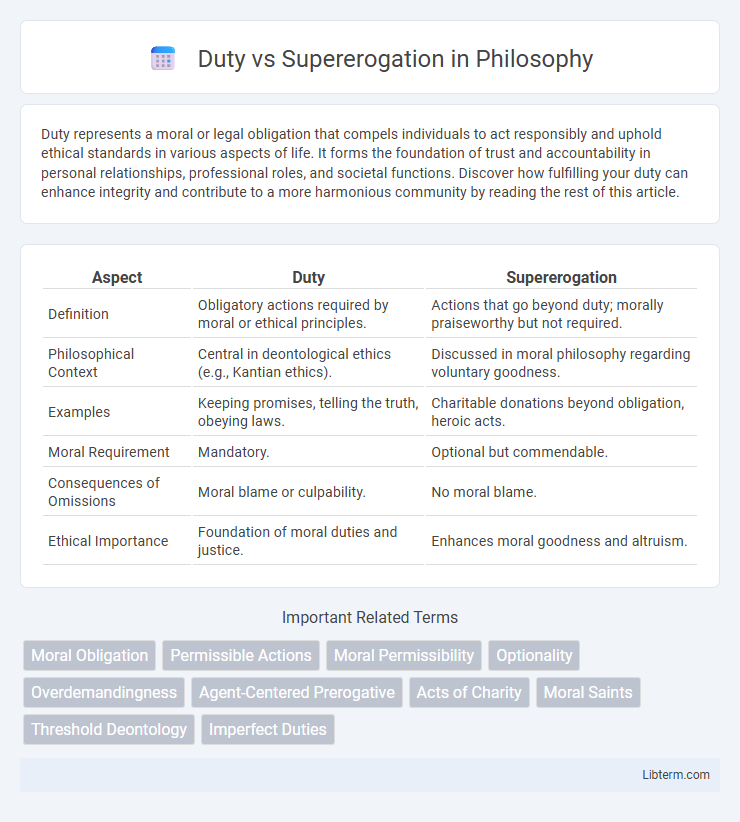Duty represents a moral or legal obligation that compels individuals to act responsibly and uphold ethical standards in various aspects of life. It forms the foundation of trust and accountability in personal relationships, professional roles, and societal functions. Discover how fulfilling your duty can enhance integrity and contribute to a more harmonious community by reading the rest of this article.
Table of Comparison
| Aspect | Duty | Supererogation |
|---|---|---|
| Definition | Obligatory actions required by moral or ethical principles. | Actions that go beyond duty; morally praiseworthy but not required. |
| Philosophical Context | Central in deontological ethics (e.g., Kantian ethics). | Discussed in moral philosophy regarding voluntary goodness. |
| Examples | Keeping promises, telling the truth, obeying laws. | Charitable donations beyond obligation, heroic acts. |
| Moral Requirement | Mandatory. | Optional but commendable. |
| Consequences of Omissions | Moral blame or culpability. | No moral blame. |
| Ethical Importance | Foundation of moral duties and justice. | Enhances moral goodness and altruism. |
Defining Duty and Supererogation
Duty refers to actions that are morally or legally obligatory, requiring individuals to fulfill responsibilities or follow rules to maintain ethical standards. Supererogation involves voluntary actions that go beyond duty, representing morally praiseworthy acts not demanded or expected by obligation. Understanding the distinction clarifies the boundaries between required conduct and exemplary behavior in ethical theory.
Philosophical Foundations of Duty
The philosophical foundations of duty trace back to Immanuel Kant, who emphasized moral obligations as categorical imperatives that apply universally and unconditionally. Duty involves actions required by ethical principles or social norms, distinguishing them from supererogatory acts, which exceed moral obligations without being obligatory. This framework underscores the necessity of duty as a baseline for moral behavior, anchoring ethical theory in rationality and universalizability.
Understanding Supererogatory Acts
Supererogatory acts are morally praiseworthy actions that go beyond the requirements of duty, representing voluntary generosity rather than obligation. These acts, such as donating a significant portion of income or risking personal safety to help others, surpass basic ethical expectations without being mandatory. Understanding supererogation highlights the distinction between what individuals must do to fulfill moral duties and what they may choose to do to demonstrate extraordinary moral virtue.
Key Differences Between Duty and Supererogation
Duty refers to moral or legal obligations that individuals must fulfill, often enforced by social or legal norms, whereas supererogation involves actions that go beyond what is required, characterized as morally commendable but not obligatory. Duties are mandatory responsibilities that maintain social order and ethical standards, while supererogatory acts represent voluntary contributions that exceed these basic requirements. The key difference lies in the obligatory nature of duties compared to the optional and praiseworthy nature of supererogatory actions.
Historical Perspectives on Moral Obligations
Historical perspectives on moral obligations reveal a longstanding debate between duty and supererogation, with Immanuel Kant's deontological ethics emphasizing strict adherence to duty as a universal moral law. Classical utilitarian thinkers like Jeremy Bentham and John Stuart Mill challenge this by focusing on actions that maximize overall happiness, blurring lines between required duties and supererogatory acts. Medieval scholars such as Thomas Aquinas distinguished duty as obligatory acts and supererogation as morally commendable but not required, shaping theological discourse on virtue and moral grace.
The Role of Duty in Ethical Theories
Duty forms the cornerstone of deontological ethical theories, where actions are judged based on adherence to moral rules or obligations rather than consequences. Immanuel Kant's ethics emphasizes duty as a categorical imperative, requiring individuals to act according to maxims that can be universally applied. This framework contrasts with supererogation, which involves morally praiseworthy actions that exceed duty but are not obligatory.
Supererogation in Religion and Culture
Supererogation in religion and culture refers to actions that go beyond moral duty or obligation, often considered exemplary or virtuous acts that are not required but highly praised. These acts, such as charity, fasting, or pilgrimage, exemplify religious devotion and cultural ideals of moral excellence, reinforcing community values and spiritual growth. Supererogatory actions contribute to personal sanctity and social cohesion by inspiring others and elevating ethical standards beyond basic duty.
Real-life Examples of Duty and Supererogation
Healthcare workers fulfilling their obligations during a pandemic exemplify duty, as their actions align with professional responsibilities and societal expectations. Donating a kidney to a stranger represents supererogation, going beyond moral duty by performing an extraordinary act of kindness without obligation. Volunteer firefighters responding to emergencies outside their assigned shifts illustrate supererogatory behavior, exceeding the requirements of their role to aid the community.
Debates and Controversies in Moral Philosophy
Debates on duty versus supererogation in moral philosophy center around whether moral obligations are strictly binding or if there exist actions that go beyond duty without being morally required. Controversies arise in defining the boundary between obligatory acts and supererogatory acts, questioning if supererogation challenges the completeness of deontological ethics. Philosophers dispute whether supererogatory actions should be integrated within duty-based frameworks or if they represent a distinct category of moral generosity.
Practical Implications for Moral Decision-Making
Duty establishes mandatory actions required by ethical frameworks, guiding individuals to fulfill responsibilities essential for social cohesion and justice. Supererogation involves voluntary, praiseworthy acts that exceed duty, offering moral agents opportunities for altruism and personal virtue without obligations. Understanding the distinction influences moral decision-making by clarifying when actions are ethically required versus morally commendable, shaping accountability and rewards in professional and personal contexts.
Duty Infographic

 libterm.com
libterm.com